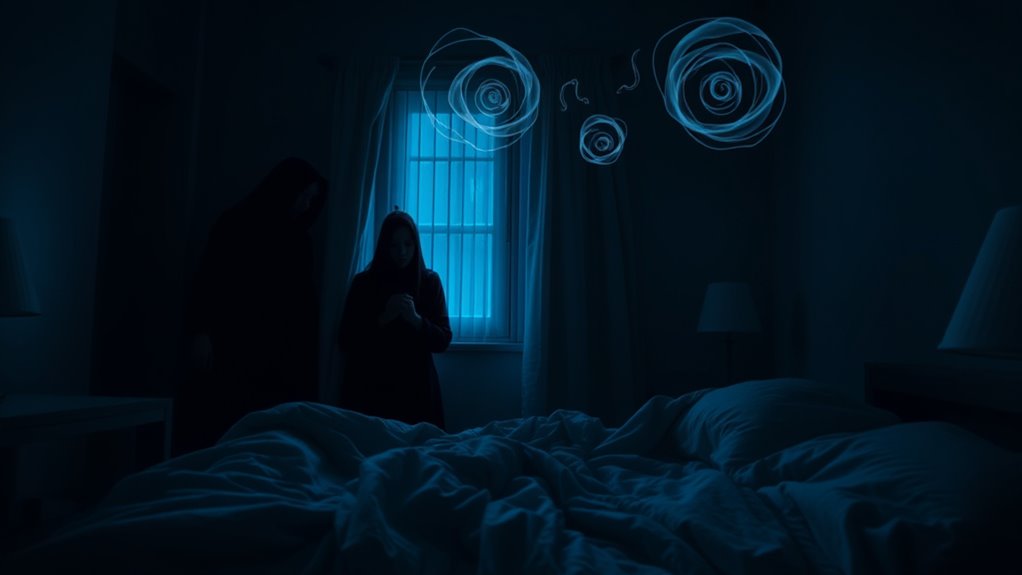Fear-based dreams usually reflect your current worries or insecurities, rather than predicting future events. They often show symbols like falling or being chased, which highlight your vulnerabilities. These vivid, unsettling dreams are your mind’s way of processing stress and anxiety. While some may wonder if they’re prophetic, most are just your subconscious working through daily fears. Stay with us to uncover more about recognizing what your dreams are truly telling you.
Key Takeaways
- Fear-based dreams typically reflect current anxieties, whereas prophetic dreams are often believed to predict future events but lack scientific support.
- Recognize if the dream contains symbols linked to personal fears or stressors rather than clear messages about the future.
- Most fear-based dreams occur during stressful times and do not have predictive power; they mirror emotional states rather than upcoming events.
- Improving sleep hygiene and managing waking stress can reduce fear-based dreams, while prophetic dreams are generally unaffected by daily worries.
- Analyzing dream symbolism and emotional responses helps differentiate between anxiety-driven dreams and those perceived as prophetic.

Fear-based dreams can grip you with intense emotions, often leaving you feeling anxious or unsettled upon waking. These dreams are powerful, and their vivid imagery can linger long after you open your eyes. Understanding what they mean involves exploring dream symbolism—how certain images or themes in your dreams represent deeper fears or anxieties. For example, dreaming of falling, being chased, or losing control can symbolize feelings of vulnerability or stress you’re experiencing in your waking life. Recognizing these symbols helps you decipher whether your dreams are simply reflections of daily worries or something more significant.
It’s also essential to contemplate your sleep hygiene, which plays a vital role in the frequency and intensity of fear-based dreams. Poor sleep habits, such as irregular sleep schedules, excessive screen time before bed, or consuming caffeine late in the day, can increase your chances of experiencing unsettling dreams. When your sleep is disrupted or restless, your brain may process unresolved fears during REM cycles, leading to more vivid and frightening dreams. Improving your sleep hygiene can help reduce the occurrence of these dreams by promoting a more restful and stable sleep pattern. Establishing a calming bedtime routine, avoiding stimulants, and creating a comfortable sleep environment can make a noticeable difference in how you experience dreams. Additionally, many retail stores now offer products that can support better sleep quality, such as sleep aids or calming teas.
You might wonder whether these fear-based dreams are prophetic or just a manifestation of anxiety. Most often, they are rooted in your subconscious mind reflecting current stressors rather than predicting future events. Your brain processes unresolved worries, fears, and emotional conflicts during sleep, sometimes manifesting as frightening scenarios. Recognizing that these dreams are more about your internal state than external predictions can help you reframe their significance. Instead of viewing them as ominous signs or messages, see them as signals that your mind is trying to work through unresolved emotions.
If you notice recurring themes that evoke strong fear or anxiety, it’s worth examining your waking life for stressors that might be fueling these dreams. Practicing good sleep hygiene can create a foundation for more peaceful dreams, but addressing underlying anxieties through mindfulness or therapy can also help reduce their impact. Ultimately, understanding dream symbolism and maintaining healthy sleep habits enables you to better interpret and manage fear-based dreams, helping you wake up feeling more refreshed and less overwhelmed by the images your subconscious presents.
Frequently Asked Questions
Can Fear-Based Dreams Predict Future Events?
Fear-based dreams can sometimes hint at future events, but they mainly reflect your subconscious worries. Pay attention to dream symbolism, as it reveals underlying emotions or concerns. Changes in sleep patterns might also influence these dreams, making them more vivid or frequent. While they may not predict specific events, understanding your dreams can help you address fears and improve your overall mental health. Stay mindful of these signs and seek clarity.
How Can I Differentiate Between Prophetic and Anxiety Dreams?
You can differentiate between prophetic and anxiety dreams by examining their dream symbolism and your emotional responses. If your dreams involve meaningful symbols pointing to future events, they may be prophetic. However, if they stem from stress or unresolved worries, they’re likely anxiety dreams. Improving sleep hygiene helps clarify dream content, making it easier to interpret whether your dreams are messages or just reflections of daily fears.
Do Fear-Based Dreams Always Indicate Underlying Anxiety?
Fear-based dreams don’t always mean you have underlying anxiety. They often reflect subconscious fears or unresolved issues, which can show up through dream symbolism. Improving your sleep hygiene helps reduce these dreams by promoting restful sleep. Pay attention to recurring themes or symbols, as they reveal emotional concerns. If nightmares persist, consider discussing them with a professional to explore their root causes and improve your overall sleep quality.
Are Certain Individuals More Prone to Fear-Based Dreams?
You might find that certain individuals, especially those with heightened anxiety or trauma history, are more prone to fear-based dreams—up to 85% of people with PTSD report such dreams. Your dream symbolism often reflects your subconscious fears, making sleep hygiene essential for reducing these distressing dreams. Poor sleep quality can intensify nightmares, so practicing calming routines before bed helps you better interpret your dreams and improve overall sleep health.
Can Therapy Help Reduce Fear-Related Nightmares?
Yes, therapy can help reduce fear-related nightmares. Through dream interpretation, you can uncover underlying anxieties causing these dreams, while therapy offers techniques like cognitive-behavioral therapy (CBT) to manage fears. Improving sleep hygiene—such as maintaining a consistent sleep schedule and avoiding caffeine before bed—also supports better rest. Together, these approaches can lessen the frequency and intensity of nightmares, helping you sleep more peacefully.
Conclusion
Remember, fear-based dreams are like shadows cast by unresolved fears. They may seem dark and threatening, but they also highlight areas needing attention and healing. Like a lighthouse guiding ships through stormy waters, your dreams can illuminate hidden anxieties, urging you to face them. Embrace these moments as symbols of growth, reminding you that even in darkness, there’s a path toward clarity and peace. Trust your inner light to lead you forward.









